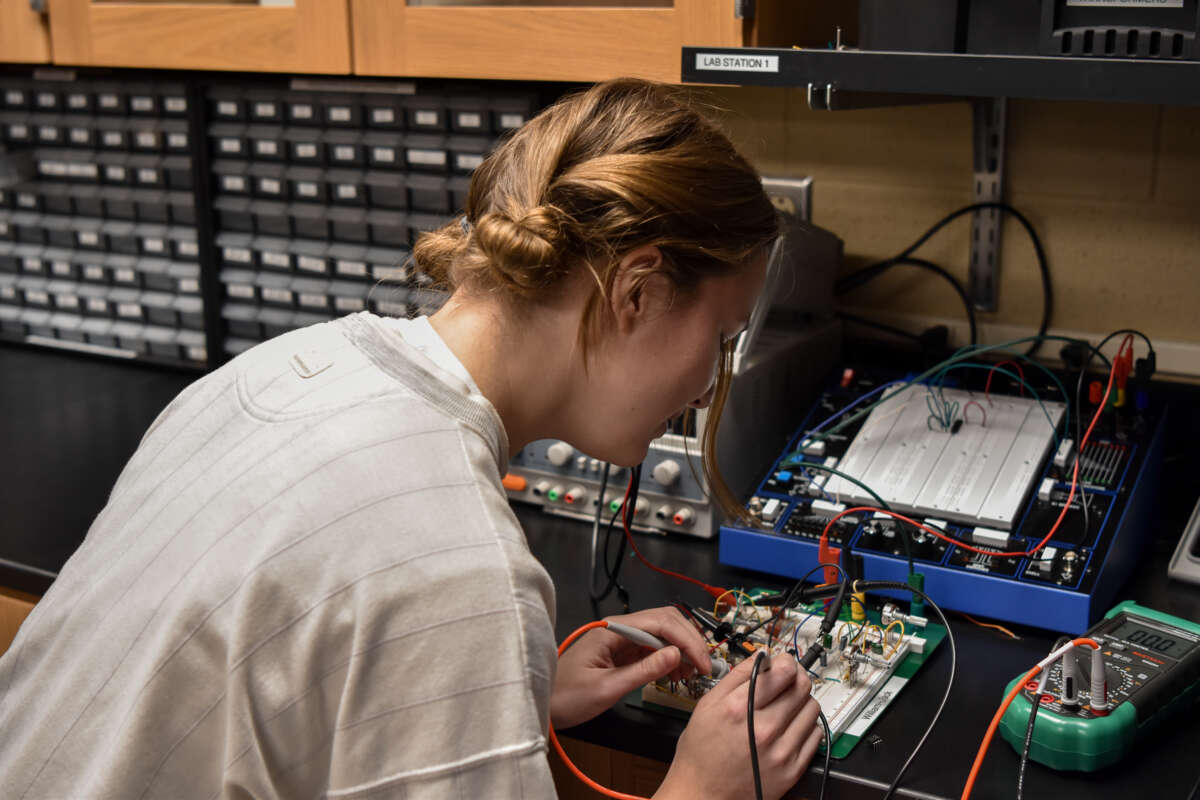Electrical engineering is a vast and vital field. It powers our modern world with innovation and technology.
From designing circuits to building power systems, electrical engineering plays a crucial role in everyday life. It drives advancements in technology, making devices more efficient and reliable. This field offers endless possibilities for creativity and problem-solving, attracting those who love to explore and invent.
Understanding the basics of electrical engineering can open doors to numerous career opportunities in industries like telecommunications, aerospace, and renewable energy. Whether you're curious about how your smartphone works or interested in sustainable energy solutions, electrical engineering provides the foundation for these innovations. It's a field that constantly evolves, shaping the future with each new discovery. Dive in to learn about its fundamental concepts and exciting potential.
Introduction To Electrical Engineering
Electrical Engineering is the study of electricity and its uses. It deals with design and development of systems that use electricity. Engineers in this field work on circuits, machines, and power systems. They make things like lights and computers work. Their work helps in building smart cities and advanced technology.
Electrical Engineering plays a key role in society today. It powers our homes, schools, and businesses. Engineers help create new technology for safer and faster communication. They work on renewable energy to help the planet. Their ideas and skills support growth and innovation in many areas. Without them, many modern conveniences would not exist.

Credit: www.benedictine.edu
Core Concepts In Electrical Engineering
Voltage is like a push for electric charges. It helps them move. Current is the flow of these charges. Think of it like water flowing in a pipe. Higher voltage means more push. More push makes more current flow. Both are important in circuits. They work together in all devices. From phones to TVs, they need voltage and current. Always handle them with care. They can be dangerous if not treated properly.
Circuits are paths for electricity. They let electricity travel. A simple circuit has three parts. A power source, like a battery. Wires that connect everything. And a device, like a bulb or a fan. The power source gives energy. Wires carry this energy. The device uses the energy. If a circuit is broken, electricity can't flow. It’s like a broken road. The energy can't reach the device. Circuits are in every electronic device.
Innovative Technologies
Smart grids make our homes and cities better. They help us use energy wisely. Smart grids talk to each other. They let us know how much power we use. This helps us save energy and money. Energy efficiency means using less power to do the same work. It keeps our planet clean. We can all help by using smart bulbs and devices. These small changes make a big difference.
Wireless power transfer is a cool idea. It lets us charge devices without cords. You just place the device on a pad. The pad sends power through the air. This is safe and easy. It works for phones, watches, and more. This technology is in many homes now. Soon, cars might use it too. Imagine charging your car without plugging it in. The future looks bright with wireless power.
Role Of Electrical Engineers
Electrical engineers create and improve devices. They work on circuit boards and control systems. Their designs must be safe and efficient. Engineers plan how devices will work. They test ideas in labs. Designs often change after testing. Engineers must fix problems. Teamwork helps in designing better products. Engineers use computers to draw plans. They think about power and energy. Safety is always important.
Problems can be tricky. Engineers use math and science to solve them. They ask questions and find answers. Creativity helps engineers find solutions. Engineers fix broken machines. They improve old devices. Problem solving needs focus. Engineers need patience and practice. They work with others to find solutions. Teamwork is key. Engineers think of new ways to help people. Their solutions make life easier.
Advancements In Renewable Energy
Solar power is getting more popular. New solar panels are very efficient. They capture more sunlight. This makes them work better. Some panels are even flexible. You can place them on roofs and walls. These panels are also lightweight. They are easy to install. Batteries store the energy from the sun. This energy can be used at night. Better batteries mean more power for homes and schools. This is good for the environment.
Wind turbines are also improving. They are now quieter and stronger. They can capture more wind. This means more electricity. Some turbines float on water. They can be placed in the ocean. This helps produce energy without using land. New designs make turbines more efficient. They can work in low wind areas. Using wind power is good for the planet. It helps reduce pollution.
Impact Of Electrical Engineering On Healthcare
Electrical engineering helps create many useful tools for doctors. Devices like heart monitors and MRI machines need electrical parts to work. These machines help doctors find and treat health problems. Pacemakers are small devices that help keep the heart beating. They use electrical signals to control the heartbeat. Without these tools, doctors would have a harder time helping patients.
Telemedicine lets doctors talk to patients using computers and phones. This is helpful for people far from hospitals. Remote monitoring checks on patients without them leaving home. Devices send health data to doctors automatically. This helps doctors know if someone needs help quickly. Patients can feel safe at home while still getting care.
Challenges In Electrical Engineering
Electrical engineering uses many resources. These can harm nature. Engineers must think about sustainable ways to build. Reducing waste is important. Using clean energy helps the Earth. Wind and solar power are good. Recycling materials can save resources. Engineers need to plan wisely. This helps the planet stay healthy.
Many electrical systems use computers. Hackers can attack these systems. This is a big problem. Protecting data is very important. Engineers must keep systems safe. Updating software helps protect from attacks. Strong passwords are also needed. Everyone must be careful online. Safety is key in engineering.

Credit: www.benedictine.edu
Future Of Electrical Engineering
Electrical engineering is changing fast. New technologies are making it exciting. Renewable energy is growing. Wind and solar power are becoming popular. Smart grids are also part of this trend. They help save energy and money. Electric cars are important too. They are better for the earth. Robotics is another growing area. Robots help in factories and homes. All these trends are shaping the future.
AI is helping electrical engineers. It makes work easier. Machine learning is part of AI. It helps machines learn new things. Engineers use AI in many ways. It helps design circuits. It also helps control power systems. AI can predict problems before they happen. This saves time and money. AI and machine learning are big parts of the future.

Credit: www.engineering.txst.edu
Frequently Asked Questions
What Does An Electrical Engineer Do?
Electrical engineers design, develop, and test electrical systems and equipment. They work on circuits, power generation, and electronics. Their role includes solving technical problems, ensuring safety standards, and improving system efficiency. They often collaborate with other engineers and technicians to innovate and implement new technologies.
Do Electrical Engineers Make Money?
Electrical engineers earn competitive salaries. Their income varies based on experience, location, and industry. Entry-level positions offer substantial pay. Senior roles can provide higher earnings, often exceeding average salaries. Pursuing this career can lead to financial stability and growth opportunities.
Electrical engineering is a lucrative field with promising job prospects.
Is Electrical Engineering Hard?
Electrical engineering can be challenging due to complex concepts and math. Strong analytical skills are essential. With dedication and practice, many students succeed. Understanding basics and practical application helps. Passion for technology and problem-solving aids in mastering the subject. Each person's experience varies, but persistence makes it manageable.
Can Electrical Engineers Make 200k?
Electrical engineers can make $200K with experience, specialization, or in high-demand industries. Advanced degrees boost earning potential.
Conclusion
Electrical engineering shapes our daily lives in many ways. From powering homes to enabling communication. It drives innovation in technology and energy. This field offers endless opportunities for creativity and problem-solving. Pursuing a career in electrical engineering can be rewarding.
It combines theory with practical skills. Engineers play a key role in developing sustainable solutions. They ensure systems run efficiently and safely. Choosing this path means contributing to future advancements. It means being part of a dynamic world. Electrical engineering is vital for progress and modernization.
A fascinating journey awaits those who embark on it.
.png)





0 Comments